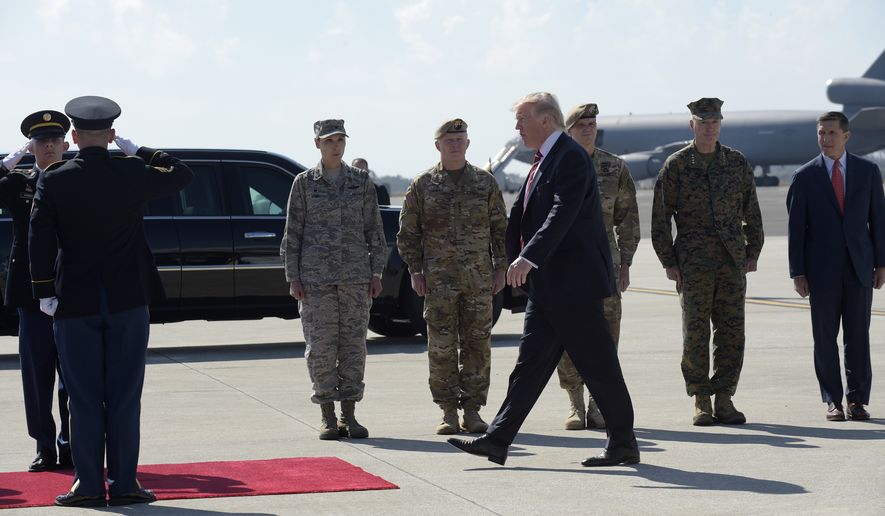Ten former top U.S. security officials and diplomats called President Trump’s executive order on travel and refugees an “ill-conceived, poorly implemented and ill-explained” plan that “could do long-term damage” to American national security and foreign policy interests.
The former U.S. officials weighed in on the controversial order in an affidavit filed Monday, urging the 9th Circuit Court of Appeals not to reinstate the ban while the constitutionality of it is challenged through a lawsuit brought by the Washington state Attorney General.
The ban could harm American interests by endangering U.S. troops abroad, serving a recruitment tool for the Islamic State, and undermining relationships between American Muslim communities and local law enforcement, wrote the coalition of former officials including Madeleine K. Albright, Avril D. Haines, Michael V. Hayden, John F. Kerry, John E. McLaughlin, Lisa O. Monaco, Michael J. Morell, Janet A. Napolitano, Leon E. Panetta, and Susan E. Rice.
“To the extent that the Order bans travel by individuals cooperating against ISIL, we risk placing our military efforts at risk by sending an insulting message to those citizens and all Muslims,” they wrote.
By damaging relations with partners overseas and at home, there is also concern the order could hurt efforts to obtain intelligence abroad about terror attacks being planned and among local Muslim communities, which law enforcement agencies rely on to identify potentially radicalized individuals.
The former officials challenged the intent of Mr. Trump’s executive order - which indefinitely stopped resettlement of Syrian refugees and temporarily stopped citizens of seven majority-Muslim countries from traveling to the U.S.
“There is no national security purpose for a total bar on entry for aliens from the seven named countries,” the officials wrote. “Since September 11, 2001, not a single terrorist attack in the United States has been perpetrated by aliens from the countries named in the Order. Very few attacks on U.S. soil since September 11, 2001 have been traced to foreign nationals at all. The overwhelming majority of attacks have been committed by U.S. citizens.”
Advertisement
They also question the degree of legal vetting it underwent before being signed into law on Jan 27.
“There is little evidence that the Order underwent a thorough interagency legal and policy processes designed to address current terrorist threats,” the officials wrote, noting that they do not believe the order was recommended by experienced intelligence and security processionals in response to any new identified threats.
Mr. Trump’s executive order, signed on Jan. 27, indefinitely halted the resettlement of Syrian refugees in the U.S., blocked other refugees for 120 days, and temporarily barred nearly all citizens of seven Muslim-majority countries — Iran, Iraq, Libya, Somalia, Sudan, Syria and Yemen — from traveling to the U.S.
U.S. District Judge James Robart issued a temporary restraining order Friday that specifically enjoins and restrains federal government from enforcing portions of the order.
The Justice Department filed an emergency motion to immediately reinstate the program while a full appeal proceeds in court, but two judges on the Ninth Circuit Court of Appeals rejected those arguments. The Washington Attorney General submitted briefs arguing for a continued hold on the executive order early Monday, and briefs are due from the Justice Department Monday evening so that the Ninth Circuit can consider next steps in the case.
Advertisement
The affidavit filed by the former U.S. officials, who include two former secretaries of state, five top Central Intelligence Agency officials, a former secretary of homeland security, and senior officials of the National Security Council, is among the numerous court documents filed Monday by individuals seeking to inform the court of the effects of the Trump administration’s actions.
Nearly 100 technology companies, including Apple, Google and Microsoft, filed a legal brief in opposition to the executive order, arguing that it “inflicts significant harm on American business, innovation, and growth.”
Minnesota was added as a plaintiff to the Washington case before Judge Robart issued his ruling, but the state of Hawaii has now also sought to intervene and to be included in the case.
Advertisement
• Andrea Noble can be reached at anoble@washingtontimes.com.




Please read our comment policy before commenting.